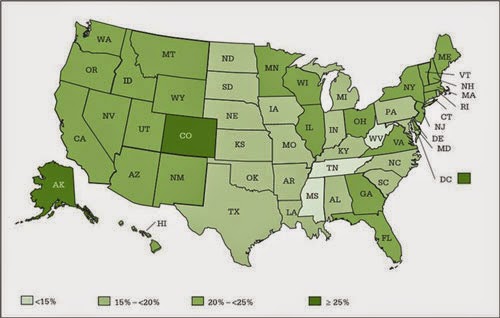Time.com recently summarized a Centers for Disease Control and Prevention (CDC) report under the header 1 in 4 Americans admit doing no exercise at all. I bet Time Inc. wouldn’t have folded if it had written Only 1 in 4 Americans does no exercise! or 3 of 4 Americans exercise! (Note the exclamation point.) Why can’t the media be more positive?
 |
| Proportion of adults by state that meet aerobic and muscle-strengthening guidelines – Behavioral Risk Factor Surveillance System, 2011 (CDC report) |
Consider three investigations that I filed over the past 18 months, waiting for the right moment. Each was based on interviews or self-reported surveys and comparisons with physical data (accelerometer measurements) collected on subsets of those surveyed. Although it wasn’t necessarily the aim of the investigation, each found people overreported the amount of exercise they did and underreported their sedentary time.
These surveys weren’t taken door-to-door out here in the Wisconsin hinterlands where there aren’t many doors. One, conducted by New York City’s Department of Health and Mental Hygiene, began with 3,811 telephone interviews; one by Louisiana’s Pennington Biomedical Research Center was an analysis of US National Health and Nutrition Examination Survey (NHANES) data on 3,725 people; and the third, a Norwegian study, included 1,751 people.
If mainstream media had grabbed these studies they might have headlined People exaggerate exercise and understate couch time. Would it be so bad to write People in the zone forget time when exercising and recovering?
 |
| Choose positivity over negativity. (multiple websites) |
And the media rushes out its negative headlines, though tomorrow’s research findings may differ from today's. Why can’t they just wait until there’s research that encourages people or makes them happy?
Last month, for example, the Southwestern Medical Center of the University of Texas, with a contributor from the University of South Carolina, reported an analysis of NHANES data from 2,223 people. They found sedentary behavior appears to have an inverse association with fitness, from which Time.com somehow headlined An hour of exercise can make up for a day of sitting down. While that might have made some people happy, it would have been better to state Exercise isn’t needed if you don’t sit. Better but not best. For the best headline, they would have had to wait for the next study.
Collaborators from the American Cancer Society, University of Texas School of Public Health and the Cooper Institute reported that the association between prolonged sedentary time and cardio-metabolic biomarkers is markedly less pronounced when taking fitness into account. Time.com reported that as Sitting all day isn’t as bad if you do this. Clearly, they missed the opportunity to combine the two studies, avoid open-ended headers and announce Exercise isn’t needed if you stay fit.
Wrap Up
I have to admit that making that last statement might hamper reporting of still another study from last month, this one from Stanford University. That research, which was also based on analysis of NHANES data, focused on obesity and concluded that declining physical activity rather than caloric intake has contributed significantly to the increase in obesity.
 |
| Smile if you’re always positive. (multiple websites) |
Time.com headlined Lack of exercise, not calories, makes us fatter. I would have preferred Eat all you want if you exercise; however, I’m willing to combine all of last month’s findings and announce You may be able to eat all you want if you stay fit. No one would ever figure that one out, but it would make them happy.
You see? It’s all in the presentation. Keep it positive. Thanks for stopping by. I hope it was encouraging.
P.S.
Time article and CDC report:
time.com/2987896/america-sedentary-states-exercise/
www.cdc.gov/physicalactivity/downloads/pa_state_indicator_report_2014.pdf
New York City comparison of self-reported and accelerometer-measured activity:
www.nyc.gov/html/doh/downloads/pdf/epi/epiresearch-pa_measures.pdf
Pennington Biomedical Research Center analysis of NHANES data:
www.ijbnpa.org/content/10/1/126
CDC’s National Health and Nutrition Examination Survey (NHANES) Program:
www.cdc.gov/nchs/nhanes.htm
Norwegian comparison of self-reported and accelerometer-measured activity: journals.lww.com/acsm-msse/Abstract/2014/01000/Comparison_of_Self_reported_versus.15.aspx
University of Texas study in Mayo Clinic Proceedings and article on Time website:
www.mayoclinicproceedings.org/article/S0025-6196(14)00382-6/abstract
time.com/2967417/exercise-sitting-down-nhanes/?xid=newsletter-brief
American Cancer Society led study and article on Time website:
www.mayoclinicproceedings.org/article/S0025-6196%2814%2900431-5/abstract
time.com/2977994/sitting-all-day-isnt-as-bad-if-you-do-this/
Stanford University study in American Journal of Medicine and article on Time website:
www.amjmed.com/article/S0002-9343(14)00191-0/abstract
time.com/2964554/its-lack-of-exercise-not-calories-that-make-us-fat-study-says/

Here's a somewhat contrarian view: "1 in 4 admit ..." probably means actual % is higher. Exercise does not necessarily mean being fit. Someone who's 30 lbs. overweight and walks 20 min. daily during lunchtime would be in the arguably "3 of 4 Americans exercise" group but certainly would not be considered fit. Or be making much progress in reducing the weight, especially if the walking is disconnected from the rest of that person's life (e.g., diet). I'd agree that, generally, positive is better than negative in trying to effect behavioral changes; though, because structure determines behavior, the structure (i.e., larger society) needs to change (a much bigger problem!). Finally, the aim, to me, is not to make people happier but healthier. Happiness is a consequence.
ReplyDeleteOh my. I'm afraid you may have taken the post too seriously.
ReplyDeleteYea, perhaps. I'm reading Ed Ayres' book, "The Longest Race," and have been thinking a lot about running as a metaphor for life--or, as I think of it, life as a metaphor for running. :) The problem of "The Soft American," though, is serious and much worse than when Kennedy had written his letter to SI with that title (http://www.ihpra.org/soft_american.htm).
ReplyDelete